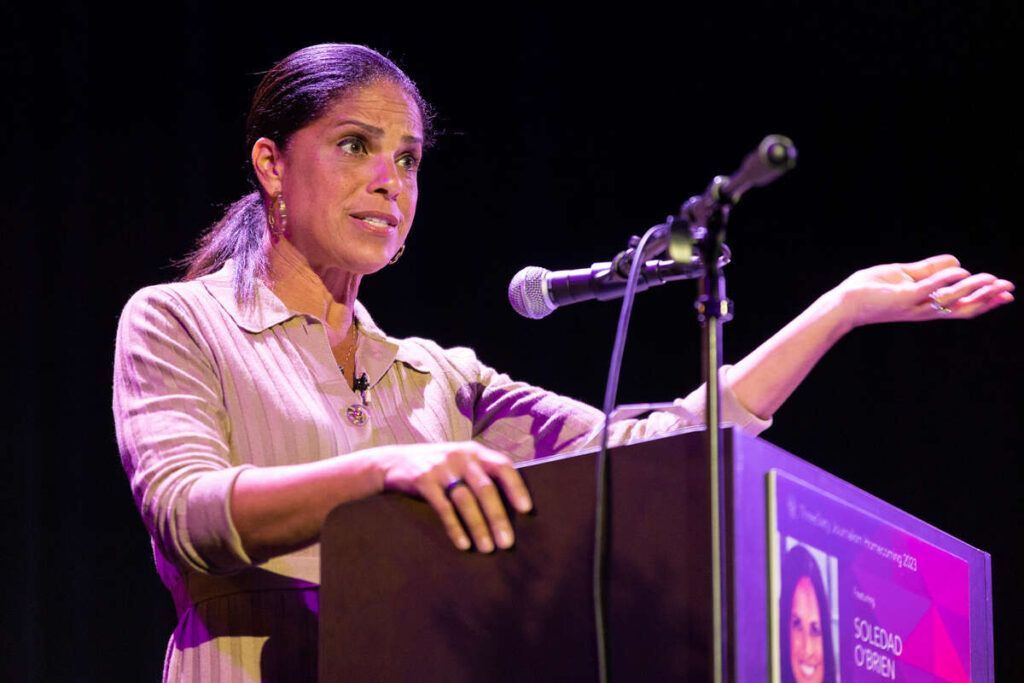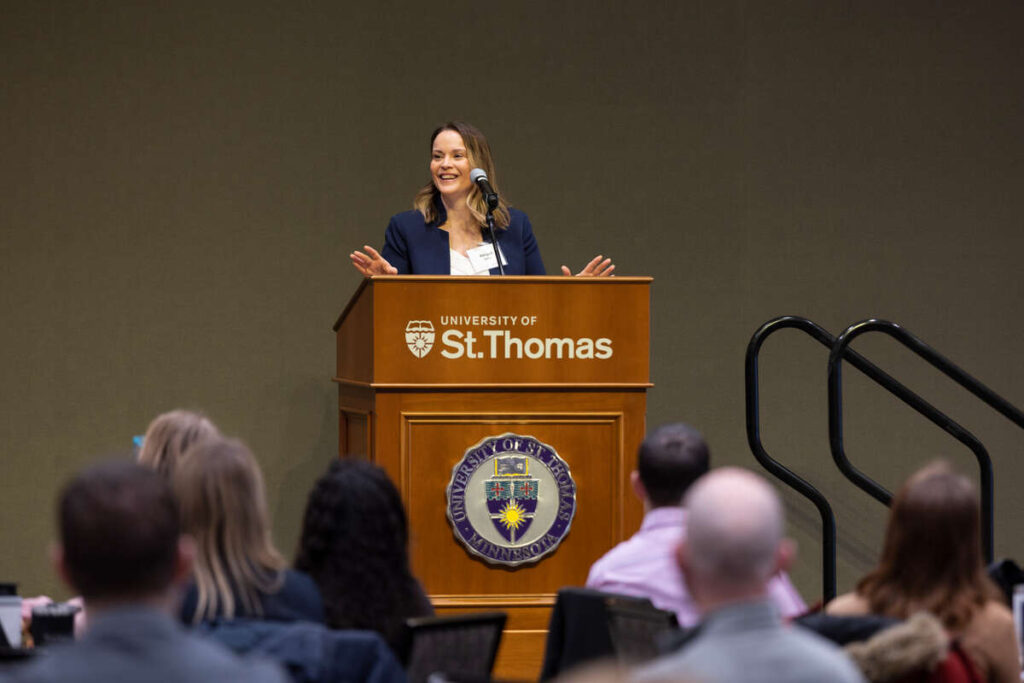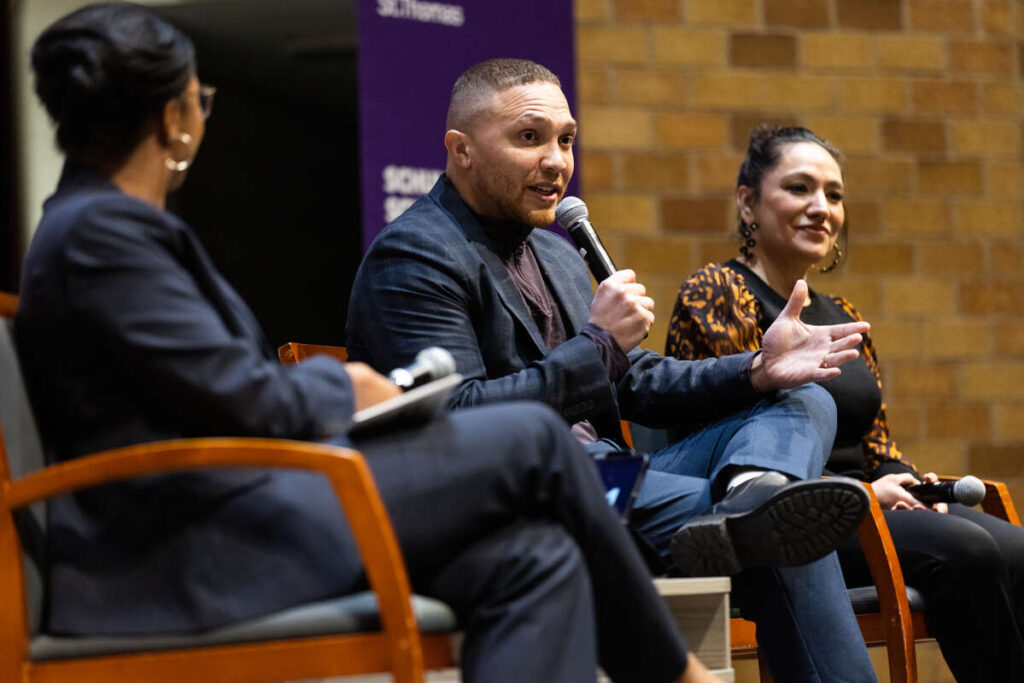At the 25th annual Stakeholder Dialogue April 19 at Schulze Hall, R. Edward Freeman, professor at the University of Virginia and author of the influential Strategic Management: A Stakeholder Approach book, engaged attendees in a discussion on “The New Story of Business: Towards a More Responsible Capitalism.”
Freeman, who has published more than 100 articles and books on stakeholder theory and stakeholder capitalism, said that a revolution in business is underway.
“While the roots of this revolution are easily traceable back to the 1980s or even earlier, they are most clearly seen in the responses to the global financial crisis of 2008,” he said.
Opus College of Business hosted the event, which was co-sponsored by The David A. & Barbara Koch Endowed Chair in Business Ethics; The Center for Ethical Organizations; and The Veritas Institute.
Here are five observations from his talk.
1. We have seen a fundamental shift in the story of business.
“We have seen an explosion of ideas of how to make businesses more responsible for the consequences of their actions,” Freeman said.
He noted that there has been a renewed interest in corporate social responsibility and sustainability. Thought leaders are stating that economic value and social value need to go hand in hand; millennials have started businesses to address social problems; and business experts are claiming a lack of ethics brought about the global financial crisis, so ethics and profits need to go together.
2. Several aspects of the old view of business are wrong.
While the traditionally held view of business is that its goal is to make as much money as possible for shareholders, Freeman told the audience that there are many reasons that this approach is no longer appropriate.
Freeman highlighted prominent entrepreneurs Steve Jobs and Bill Gates, who rather than being solely focused on making money, were “on fire” about the desktop computing revolution.
Next, Freeman emphasized that business ethics isn’t a contradiction.
“If you ask people around the world to write down their three most important values that they would like to teach their children, or their three most important ethical principles, they all pretty much write the same thing,” said Freeman. “There is some version of respect, honesty and integrity, caring and love, and responsibility.”
As ethics involves how people live their lives and interact with each other, following ethical practices allows a society to flourish while keeping order.
Third, Freeman pointed out that people are complicated, and traditional economic and business theories don’t always apply.
“We’re not always driven by extrinsic if-then rewards,” he said. “We want to be engaged in doing something that has meaning and purpose.”
3. A new story of business is emerging.
Freeman shared six new ideas that form the foundation of business today:
- The unit of analysis is stakeholder relationships. Rather than just focusing on shareholders, businesses need to look to a broader group of stakeholders. In connecting with stakeholders, businesses need to build loyalty in order to weather challenging times.
- Stakeholders are interdependent. Creating value for one affects all of the others.
- Trade-offs are managerial failures of creative imagination. “Economists love trade-offs. In fact, one of the hallmarks of modern economics is that one can always calculate trade-offs. I have become increasingly skeptical of trade-off thinking,” said Freeman. “In fact, I believe that the drive to collaborate and avoid trade-off thinking is far more powerful. When we see the task of the executive as getting stakeholder interests all going in the same direction over time, trade-offs will disappear.”
- Purpose, values and ethics must be embedded in organizations. Rather than purely focusing on profits, employees and other stakeholders will be inspired if organizations have an appropriate purpose, values and ethics at its core.
- Business exists in the physical world. Pointing out that the physical world places constraints on businesses, Freeman said that those constraints also can be opportunities. Using 3M as an example of a company turning waste streams into products and services, he said that green values can lead to creativity.
- People are complicated. “People are using business models and ideas to attack age-old problems of poverty, education, disease and more participation in society. … We have seen a wave of ‘social entrepreneurs’ and ‘impact investing’ where the explicit idea is to use business to make society better and to solve social problems. I believe that we are fast crafting a new idea about what it is to be human,” said Freeman.
4. More ideas are needed for responsible capitalism.
To move towards a more responsible capitalism, responsibility throughout society is important. Another needed idea is that customers, as well as any stakeholders, have choices. Third, while government should still play its role as both regulator and redistributor, government also should facilitate value creation through infrastructure and other programs enforcing civil rights.
5. You can practice responsible capitalism right now.
Practically speaking, Freeman, shared five tactics attendees could use in their businesses to practice more responsible capitalism:
- Rediscover your purpose and the values that go with it.
- Perform a systems/process check on the purpose and values.
- Begin live conversations about the purpose and values.
- Be a community builder.
- Communicate how your organization makes the world a better place.
To learn more about Freeman, visit his website.






